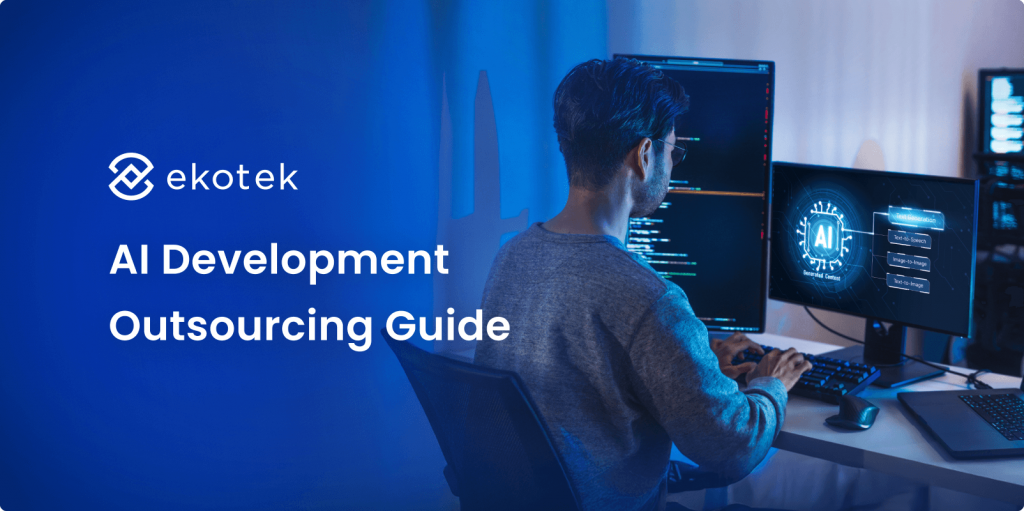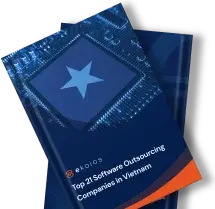Introduction
In a landscape where innovation is paramount, businesses face constant pressure to optimize operations and enhance customer experiences. Artificial Intelligence (AI) has emerged as a transformative force, offering capabilities to reshape entire businesses through automation, enhanced customer interaction, and tailored experiences.
However, developing in-house AI capabilities requires substantial investments in talent, infrastructure and well-structured data. Many companies find it challenging to progress beyond initial experimentation and effectively implement scalable AI systems.
This is where AI outsourcing becomes a strategic advantage. Our blog will dive into how businesses benefit from AI development outsourcing and some tips to help you find the right AI development partner.
Key benefits of AI outsourcing for businesses

Cost savings
Hiring AI engineers, data scientists and machine learning experts in-house can be prohibitively expensive, especially for small or mid-sized companies. According to industry reports, the average annual salary for an AI engineer in the U.S. exceeds $150,000, not including bonuses and equity. For a full AI team, the yearly payroll alone can easily exceed $500,000. Add to that the cost of infrastructure, tools, training and continuous R&D.
With outsourcing, companies only pay for what they need, whether it’s a one-time model development or a long-term AI product. This on-demand resource model significantly reduces operational and capital expenditures.
⭐️ Dive into our insightful blog: How much does AI cost?
Access to specialized expertise
AI is not a one-size-fits-all domain. Different products require different tools, frameworks and approaches. Outsourcing gives you access to a global pool of talent, experts with proven experience in building real-world AI systems across sectors like retail, healthcare, manufacturing, finance and logistics.
The talent pool in Asia, for instance, has been rapidly growing, with many skilled professionals trained in AI and machine learning. Countries like India, China and Vietnam are home to highly qualified engineers and data scientists who offer competitive rates. This means that companies can tap into specialized expertise at a fraction of the cost compared to hiring in-house talent.
🔹 You may be interested in Which software outsourcing countries in Asia are best for you?
Faster time-to-market
Speed is often critical when leveraging AI for competitive advantage. With outsourced teams ready to go, businesses can cut down months of recruitment, training and experimentation.
A capable outsourcing partner brings ready-to-use pipelines, reusable models, and tested workflows. For instance, a financial services firm could partner with an outsourcing team to launch a fraud detection system in justc3 months, instead of the typical six to twelve months required for in-house development.
Scalability
AI initiatives often start small but grow rapidly once value is demonstrated. Outsourcing allows businesses to scale up or down based on project requirements. Whether you’re expanding from a pilot project to a full product or scaling across departments, your outsourcing partner can adjust team size and expertise accordingly.
Focus on core business
Managing AI development in-house diverts attention from core functions like operations, sales, or customer service. With external experts managing your AI pipeline, your internal teams can focus on strategic business priorities.
For example, a logistics company can concentrate on optimizing delivery routes and customer service while an outsourced team handles the development of their route optimization algorithms, leading to more efficient resource allocation and smoother operations.
Access to the latest tools and technologies
AI development evolves rapidly, with new frameworks, libraries and tools constantly emerging. Outsourcing partners often stay up to date with the latest AI trends and tech stacks, ensuring your solution is built using modern, well-supported tools. This helps avoid technical debt and gives your business a future-proof foundation.
Reduced risk
AI projects carry inherent risks, models may underperform, data may be incomplete, or business assumptions might not hold. With an outsourced team, you can test hypotheses and iterate faster without long-term commitments. This de-risks innovation and encourages a fail-fast-learn-fast mindset
Easier entry into emerging markets or domains
Expanding into a new market or industry vertical that requires AI (entering a logistics market with route optimization AI) can be complex. Outsourcing provides a low-friction way to test and launch AI-powered offerings without needing full domain expertise in-house from the start.
Challenges in AI outsourcing

While AI development outsourcing offers numerous advantages, businesses must also be aware of potential challenges that can impact project success. Understanding these hurdles early can help you proactively mitigate risks and choose a better-suited outsourcing strategy.
Integration with existing systems
One of the most common challenges is integrating AI solutions with legacy infrastructure or custom-built platforms.
If the outsourced solution is developed in isolation without proper alignment with your internal IT environment, integration can become complex and error-prone. Clear documentation, collaboration between your internal team and the vendor are critical to a smoother integration.
Unpredictability of AI outcomes
AI models, especially ML and deep learning algorithms, are inherently probabilistic. Even with good data and sound development, outcomes may vary or evolve over time.
This lack of determinism can make it difficult for decision-makers to fully trust the system. It’s important to work with vendors who emphasize explainability, provide model performance monitoring and continuously retrain models based on feedback loops.
Cost of implementation
While outsourcing generally reduces costs compared to building in-house, AI projects can still be expensive, especially in early stages when data preparation and infrastructure setup are required.
Unexpected scope changes or overly complex models can further inflate costs. To control spending, businesses should insist on clear project scoping and transparent communication with outsourcing partners.
Data privacy and security risks
AI systems rely heavily on data, much of which may be sensitive or proprietary. When working with an external team, there is always a risk of data breaches and IP leakage.
To mitigate this, businesses should vet partners based on their data handling protocols, sign NDAs, ensure infrastructure is secure and check for compliance certifications.
Lack of internal understanding
Even when development is outsourced, the lack of internal AI literacy can hinder success. If your leadership or operations don’t understand how the AI system works or how to evaluate its output, it creates a gap in adoption and decision-making.
To address this, consider having your vendor provide internal training sessions, documentation and ongoing support to ensure knowledge transfer.
6 approaches to AI development outsourcing

End-to-end AI outsourcing
The outsourcing partner handles everything, from requirements gathering to final deployment and ongoing maintenance. This approach is ideal for companies with limited internal AI expertise or those seeking a turnkey solution that minimizes their involvement in technical details.
For example, a startup looking to develop an AI-driven customer service chatbot might partner with an outsourcing firm that takes care of everything, including design, development, testing and deployment.
Task-specific AI outsourcing
Companies outsource specific components of an AI project, such as data annotation, model testing, or user interface integration, while keeping core development in-house. This model allows companies to leverage external expertise for particular tasks without relinquishing control over the entire project.
AI consulting
AI consulting engagements are typically short-term and strategy-focused. Consultants assess your AI readiness, define business cases, and design high-level architecture or roadmaps for implementation. This approach is especially valuable for organizations just beginning their AI journey.
Dedicated development team
In this model, you work with a remote, full-time AI development team dedicated solely to your projects. This hybrid approach offers greater control and allows for long-term collaboration without the need for full in-house hiring.
📌 Want to learn more about AI outsourcing models? Read this Outsourcing models – Choose the best fit for your business
AI as a Service (AIaaS)
This model involves vendors offering pre-built, cloud-based AI solutions that can be quickly integrated into your business operations. Examples include chatbots, recommendation engines, or fraud detection systems that require minimal setup.
For instance, an e-commerce company might utilize an AIaaS platform to implement a recommendation engine that personalizes product suggestions for customers, enabling rapid deployment.
Build, operate, transfer (BOT)
Under the BOT model, the outsourcing partner sets up and runs an AI development team for you, then transfers it back once it’s fully functional. This approach is suitable for companies looking to internalize their AI capabilities over time.
| Approach | Pros | Cons | Best for |
|---|---|---|---|
| End-to-end outsourcing | – Low involvement required – Fast time-to-market – Full vendor accountability |
– Less control – Limited internal learning |
Non-tech businesses, startups, SMEs |
| Task-specific outsourcing | – Flexibility – Cost efficiency – Leverages external expertise |
– Requires strong project management – Potential integration complexity |
Companies with internal AI/project team |
| AI consulting | – Strategic insights – Risk reduction – Quick assessment |
– Not an execution model – Often requires follow-up vendors for development |
Businesses in early AI exploration stage |
| Dedicated development team | – Long-term alignment – More control – Scalable over time |
– Higher cost than task outsourcing – Requires strong coordination |
Enterprises building core AI products or R&D capabilities |
| AIaaS | – Quick to deploy – Cost-effective – No need for internal team |
– Limited customization – May not fit complex use cases |
E-commerce, customer service, marketing analytics |
| Build, operate, transfer | – Long-term knowledge transfer – Ownership over time – Vendor bootstraps setup |
– Longer ramp-up period – Higher initial investment |
Large enterprises planning AI centers or in-house teams |
How to choose the right AI outsourcing partner

The right vendor can significantly enhance your capabilities, while the wrong choice can lead to wasted resources and missed opportunities. Here’s a detailed guide to help you navigate the selection process effectively.
🔎 Dive into our guide: Software outsourcing vendor evaluation – A complete guide for successful partnerships
Understanding your AI needs
Before engaging any outsourcing firm, take time to define your AI maturity level, business objectives, and desired outcomes.
Key steps:
- Define objectives: Are you looking for a full product, a prototype or just guidance?
- Identify requirements: Do you need industry-specific solutions like predictive maintenance, fraud detection or personalized recommendations?
- Align expectations: Understanding your goals helps you filter partners who align with your vision, timeline and resource constraints.
AI portfolio and technical expertise
Evaluate the potential partner’s previous AI projects to assess their technical capabilities. Look for vendors with real-world experience in AI applications similar to yours. A good partner will not only know the tools (TensorFlow, PyTorch) but also how to apply them in practical business contexts
Key actions:
- Review case study: Request detailed case studies to gauge their problem-solving approach and success metrics.
- Client references: Speak to past clients to understand their experiences.
- Technical demos: Ask for access to GitHub repositories or demo environments
Industry-specific experience
AI solutions can vary significantly by sector, so it’s vital to choose a partner familiar with your industry. An AI vendor with industry-specific experience will be more adept at customizing solutions to meet your unique challenges and compliance requirements.
You should look for:
- Clear project plans: Ensure they provide detailed project plans with milestones and deliverables.
- Regular progress updates: Opt for partners who commit to regular check-ins and updates to keep all stakeholders informed.
- Single point of contact: Having a dedicated project manager or account manager simplifies communication and accountability.
- Flexible engagement options: Ensure they offer various engagement models (hourly, fixed-price, or dedicated teams) that align with your project scope and budget.
Communication and collaboration
Inquire about the vendor’s communication channels, responsiveness, and language proficiency. Consider factors such as time zone differences, availability for meetings, and their ability to understand and articulate your project requirements.
Key considerations:
- Communication tools: Which tools do they use for communication and project management, such as Slack, Zoom, SharePoint, or Asana? Familiarity with these tools can enhance collaboration.
- Language proficiency: Ensure that team members can communicate clearly in your preferred language to minimize misunderstandings.
Proven data security and compliance practices
AI projects often involve sensitive data, making data security a top priority. Your outsourcing partner should demonstrate robust data protection measures and compliance with relevant standards.
Key questions to ask:
- Encryption policies: How do they secure data in transit and at rest?
- Access controls: What measures are in place to restrict data access to authorized personnel only?
- Audit trails: Do they maintain logs of data access and modifications for accountability?
- Data storage practices: Where is the data stored, and what security protocols are in place to protect it?
Strategic alignment
A great AI outsourcing partner goes beyond merely developing models. They should understand your business objectives and help define the right problems to solve.
Consider the following:
- Insights on workflow optimization: Does the partner provide suggestions on how AI can improve your existing processes?
- Roadmap development: Are they willing to collaborate on your AI roadmap, ensuring alignment with your business goals?
- Industry trends: A proactive partner will keep you informed about innovations and trends relevant to your industry, helping you stay competitive.
Ekotek as your AI outsourcing partner
Ekotek – a Clutch verified leader in software development, empowers businesses to harness the full potential of AI through tailored solutions designed for scalability, speed, and significant impact.
What sets us apart:
- Full-spectrum AI services: We offer a comprehensive range of services, from initial consulting to full-scale development, upgrades, and ongoing maintenance.
- Industry expertise: Successfully delivered AI solutions across various sectors, including finance, manufacturing, logistics, and more, ensuring a deep understanding of industry-specific challenges and opportunities.
- Diverse technology stack: We are proficient in a wide array of frameworks and languages, like LangChain, TensorFlow, PyTorch, Python, Java, OpenCV,…
- Security-first mindset: Adhere to enterprise-grade security protocols and data privacy standards, safeguarding your sensitive information throughout the project lifecycle.
Whether you need IT staffing solutions or a dedicated AI development team, Ekotek provides the perfect blend of technical expertise and business insight to drive your success. Let’s transform your AI vision into reality!
Final thoughts: Is AI development outsourcing right for your business?
AI development outsourcing is no longer just a cost-saving tactic, it’s a strategic move that enables businesses to innovate faster, reduce time-to-value, and stay ahead in the digital race. By outsourcing AI development, companies can accelerate deployment, scale AI initiatives flexibility and focus internal teams on core objectives
However, success depends on choosing the right outsourcing partner, one that not only delivers code but also understands your industry and helps you navigate the evolving AI landscape.
Ready to explore AI development outsourcing for your business? Contact Ekotek today for a free consultation and discover how we can turn your AI ambitions into real-world results.


